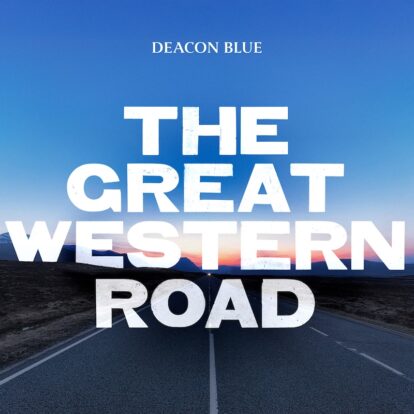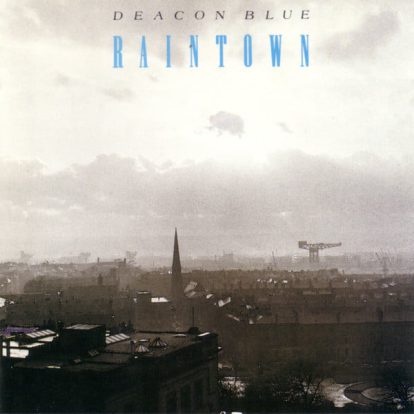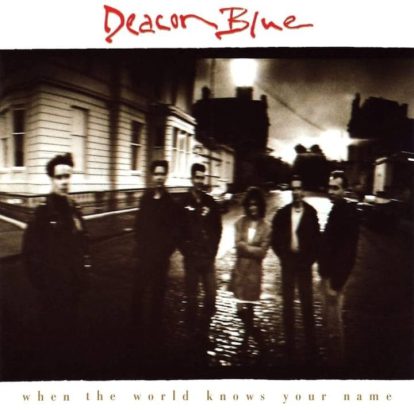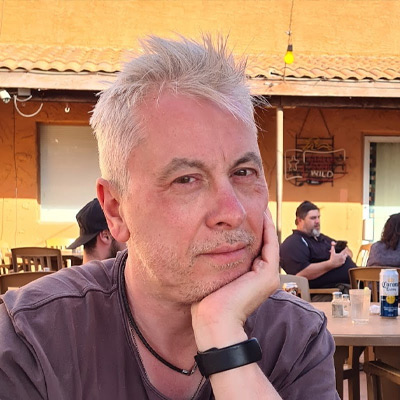“As you get older, you try to make sense of the past” - Ricky Ross
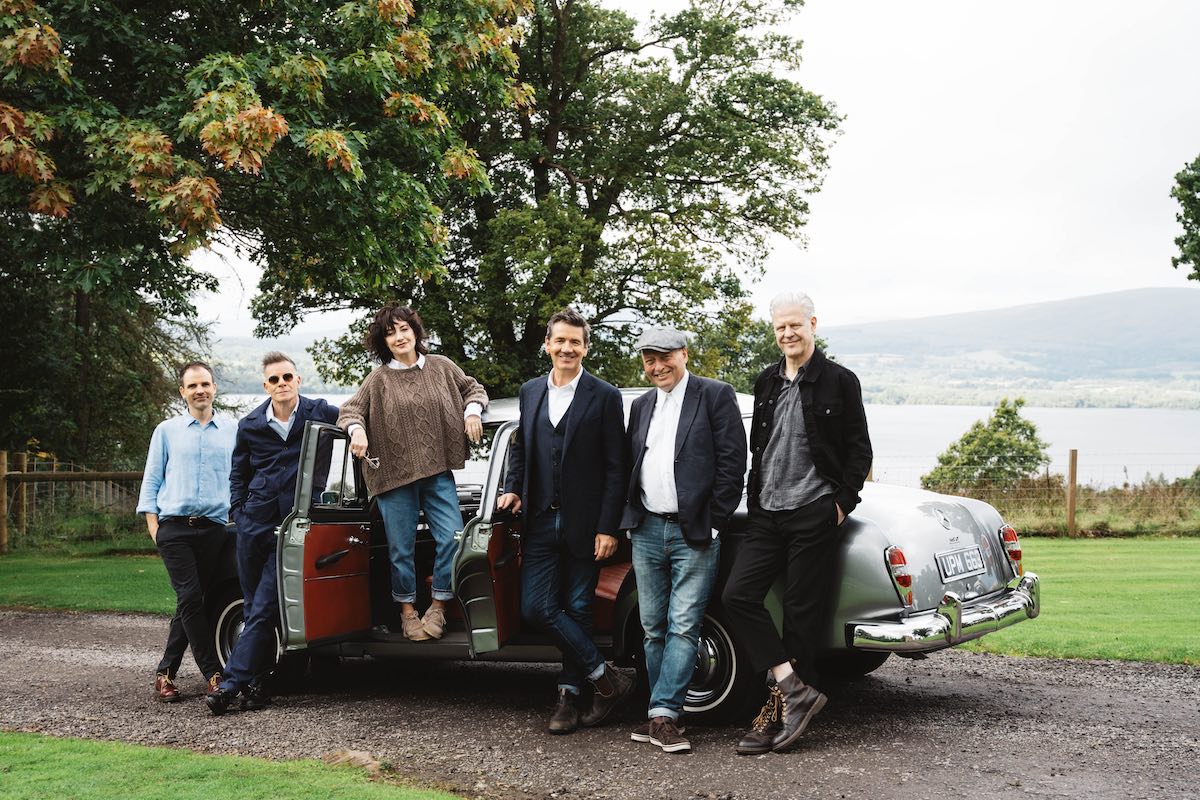
Scottish pop rockers Deacon Blue are celebrating their Ruby anniversary this year with a new album, The Great Western Road. Classic Pop talks to frontman Ricky Ross about the secret of how to survive four decades in a band and still be having fun…
On Deacon Blue’s latest album, The Great Western Road, chief songwriter Ricky Ross is in a reflective mood. Formed in 1985, with debut LP Raintown released two years later, 2025 marks the 40th birthday of one of Scotland’s premier pop-rock acts. It was 1988’s Real Gone Kid that would be their breakthrough success, with its accompanying album When The World Knows Your Name peaking at No.1 in the UK. Not a band who usually look backwards, this year’s anniversary has nudged Ross into a nostalgic frame of mind – the video for Late ’88 is made up of photos and clips from previous decades.
“As you get older, you try to make sense of the past,” he tells us over Zoom from his home in Glasgow. “It’s not always nostalgia, it’s often puzzlement, like, why do we do that? Why didn’t we do this? You get to a certain age, and you’re able to look back to try to work out the paths of where you came from.”
How does it feel celebrating 40 years of Deacon Blue? Did you ever think you’d get this far?
Ricky Ross: If someone had said to us in 1985, “Go and check this act out, they were around 40 years ago,” you’d have laughed at them, because that would have been 1945! At that age, you just weren’t interested in anything that happened even five or 10 years before, it just felt really old. But here we are.
Though this year is the 40th anniversary since Deacon Blue’s formation, Late ’88 looks back to 1988. Why that year specifically?
It was particularly Real Gone Kid. Up until that point, we’d released songs from Raintown, but I mean, all I wanted to do was make an album. I think it was halfway through making Raintown, someone mentioned singles, and honestly I don’t think we’d given it any thought! I mean [the four singles] scraped into the chart with a bit of help, but they didn’t really change our life or anyone else’s. But later, in late 1988, we released Real Gone Kid and that really did change our lives. We were on telly for the first time significantly, and I always remember trying to buy a coat in Marks & Spencer and people looking at me. Suddenly it was like, people know who you are because you’ve been on television.
How did you keep it together back then? Overnight success can make some people go a little crazy…
It does mess with your head a bit. I think we all probably dealt with it in different ways. But I think the point of Late ’88 is it was fun, too. It was exciting and that’s what pop music should be. The thing about a hit song is that that’s the point of it, that it becomes something so ubiquitous that everyone knows it, and that was one of the things we wanted to do. It was a wild rollercoaster ride for a few months, but good fun.
There’s a line in Late ’88 – “Never thought about tomorrow”. What would the Ricky Ross of 1988 think of the Ricky Ross and Deacon Blue of 2025?
I would have been really shocked if someone had told me that we were still doing it. I remember doing an interview early on with a Japanese television crew, and I said, “I think we’ll make three albums, then we’ll split up.” In fact, we made four and then split up. I always saw it as a finite thing – I didn’t have any long-term plans. Even 20 years ago, I would have still been shocked that we’re still doing it, and certainly shocked that we’re enjoying doing it, and that the social aspect of the band, the cohesion of the band, is good.
You’re one of the few groups with 40 years behind them who aren’t full of replacement members. How have you managed to keep most of that original line-up together?
Having the break helped. We split up in ’94 and didn’t get back together til ’99, so all of us found our feet a little bit, we found different paths. Take Dougie [Vipond], for example. He started doing television work, which is a big part of his life. Jim [Prime] started teaching and went over to France and played with Johnny Hallyday, and did lots of things, Lorraine [McIntosh] started acting [she made her big screen debut in Ken Loach’s 1998 movie My Name Is Joe ], and I started writing and working with other musicians. Being in one band and never getting outside of that little circle isn’t good.
One of the great things about creating music is making it with other people. So all of us got that other hinterland together, and when we came back together, we thought, “You know what, we’ve worked with different people, we’ve done different things, our little thing isn’t as bad as maybe we thought it was – maybe it just doesn’t have to be this 100% thing that dominates our lives.” We do have other places to go when it all gets too much, so when we do come back together, we can make it really, really good.
It’s been four years since the band’s last album, Riding On The Tide Of Love. What’s the relevance of the new record’s title, The Great Western Road?
I’m a great collector of titles. Like a lot of songwriters, you collect them, then you try to work out what it is and what’s it leading to. So we were driving out of the city and I was thinking about these big avenues that lead up to Glasgow. It’s a big city, but there are these iconic roads, with Great Western Road being, in some ways, the most pertinent one, because when we were starting off, that was our hub, our meeting point. That road leads out to this beautiful wilderness, and in some ways, out to the unknown.
I thought it was just a great metaphor for where I am in my life, and where we are – you just don’t know what’s next. It was 20 years ago that Graeme [Kelling], our guitarist, died – that came over a period of being ill for five years, but you just don’t know what changes one year will bring. I always wanted to write songs about being honest and being at the point we’re at, and the Great Western Road allowed that metaphor to be there. So it was all really under that title and umbrella, and then the songs started to emerge.
What’s the difference between making an album now and the way you made them in the 80s?
The difference is that then, you did an album, you did an extensive tour, and then you made another album. Having that hinterland I talked about earlier is also very handy. After we finished [2020’s City Of Love], it was terrible, because the album had no sooner come out than it was lockdown, and we couldn’t do half the promo that we were meant to do – and we certainly couldn’t do the shows. But I was able to do a solo record [Short Stories Vol. 2] because I did that in the house. That got that bit of frustration out. Having more things to do helps in a strange way.
What’s next for the band?
We don’t really make big plans. This year is sort of mapped out, because we’ll be touring and doing promo for this record. In the meantime, I’ve been working for the last five years on a project called Small Acts Of Love, which finally goes on stage this summer at the Citizens Theatre [in Glasgow]. Unfortunately, it’s around the same time we’re on tour, so that will be quite busy, because there’s a lot of work still to be done on casting a band and singers, so that’s my summer project. The songs are written, the play has been written, but every time it goes in a workshop, it changes. So I suspect when it goes into rehearsal, it might change again, but we’ll see what happens.
For further information click here
Sign up to our weekly newsletter
Classic Pop may earn commission from the links on this page, but we only feature products we think you will enjoy.

